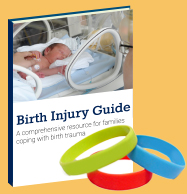Birth Injury Website for Special Needs Parents

Birth injuries are at the root of many special needs diagnoses in children. Therefore, it’s a delight to introduce you to a new website, Birth Injury Guide, which is devoted to educating and supporting parents. Today’s guest post comes from Leigh Egan. She’s a writer who, as a mother, has a special interest in children’s issues. She researches and writes about health problems and cognitive behaviors that stem from birth trauma. In this post, she acquaints you with what’s available at the site.
Birth Injury Guide Dedicated to Comprehensive Information
Each year, thousands of babies are injured before, during, and shortly after childbirth. Unfortunately, even the smallest medical mistake can lead to a lifetime of health problems, and in some cases, permanent cognitive disabilities for injured infants.
As a result, a comprehensive site, Birth Injury Guide, was recently created as an in-depth, resourceful guide for people to learn more about birth injuries and the traumatic impact it can have, not only on babies, but family, friends, and loved ones. Here are a few of the most common types of birth injuries.
Brachial Plexus Injuries
The brachial plexus is a set of nerve fibers that run from the spine and throughout the neck, armpit, and arms. When the brachial plexus nerves are injured, weakness, pain, numbness, and even paralysis may occur.
During childbirth, and often during a difficult, stressful delivery, an infant’s brachial plexus is at risk for injury if a physician tugs or twists too forcefully when trying to pull the baby out. If birth-assisting tools are used incorrectly, such as forceps or a vacuum extraction tool, the risk of injury heightens even further. The two most typical brachial plexus injuries include:
- Erb’s Palsy occurs when the brachial plexus nerves in the upper arm is damaged. Symptoms may include arm numbness, loss of sensory function, weakness in the affected arm, and full or partial paralysis.
- Klumpke’s Palsy affects the muscles in the forearm and the hand of the affected area. Symptoms may include a claw-like appearance to the affected hand, limp or paralyzed arm on the affected side, lack of muscle control, and loss of feeling in the affected area.
Brain Injuries
Traumatic infant brain injuries happen to numerous babies each year. Brain injuries can occur for a variety of reasons, including oxygen deprivation during childbirth, untreated jaundice that leads to kernicterus (a rare type of brain damage marked by excessive bilirubin), physical trauma, and even maternal infections.
Symptoms of brain injuries will depend on how severe the damage is, and how the injury occurred. Generally, however, signs and symptoms may include development delays, abnormal temperament, and an usual physical appearance, such as a small skull, deformed facial features, and spinal cord abnormalities.
Bruises and Lacerations
Bruising is common during childbirth, and most infants will go on to heal without any problems. Lacerations, however, can lead to long-term medical problems, such as face nerve palsy, bone fractures, cervical cord injuries, and cephalhematoma. According to the National Institutes of Health (NIH), pregnant women who have cesarean section (C-section) deliveries are much more likely to have infants who sustain lacerations.
In addition, the Patient Safety Authority (PSA) states that a recent study indicates that 1.5 to 1.9% of babies born via C-sections experienced lacerations. A similar study by NIH, however, shows that fetal lacerations occur at least 3% of all pregnancies.
How We Can Help
Along with extensive resources and information on birth injuries, Birth Injury Guide provides comprehensive details treatment options, financial resources, state programs and assistance for disabled children, and much more. In addition, we have medical experts and assistants available to help people with any questions or concerns about their baby’s injuries.
For more information, we invite you to visit BirthInjuryGuide.org. You can also find us on Twitter and Facebook.
Do You Have Birth Injury Experience?
Do you have a child with a birth injury? If so, Different Dream and Birth Injury Guide would love to hear from you. Leave your questions or story in the comment box.
Do you like what you see at DifferentDream.com? You can receive more great content by subscribing to the quarterly Different Dream newsletter and signing up for the daily RSS feed delivered to your email inbox. You can sign up for the first in the pop up box and the second at the bottom of this page.
By Leigh Egan
Subscribe for Updates from Jolene
Related Posts
Did I Trust God’s Plan for the Life of My Child with Disabilities?
Jolene looks back on the lessons she’s learned and ponders, “Did I trust God’s plan for the life of my child with disabilities?”
Two Coping Skills for Families with Disabilities
Guest blogger Kristin Faith Evans explains two coping skills for families with disabilities that have helped her over the years.
Special Needs Homeschooling: The Ups and Downs
Special needs homeschooling is full of ups…and downs. Guest blogger Lisa Pelissier knows this from experience. In this post she describes her adventures in homeschooling, which began long before she discovered she had joined the special needs homeschooling tribe. I...






0 Comments